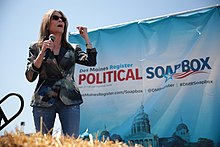Soapbox

Asoapboxis a raised platform on which one stands to make animpromptuspeech, often about apoliticalsubject. The term originates from the days when speakers would elevate themselves by standing on a woodencrateoriginally used for shipment ofsoap,or other dry goods, from a manufacturer to a retail store.
The term is also usedmetaphoricallyto describe a person engaging in often flamboyant, impromptu, or unofficialpublic speaking,as in the phrase, "Get off your soapbox."Hyde Parkin London is known for its Sunday soapbox orators, who have assembled at itsSpeakers' Cornersince 1872 to discussreligion,politics,and other topics.Blogscan be used as soapboxes within the context of theWorld Wide Web,and are often used for promotional purposes.
History
[edit]Origins of the term
[edit]Throughout the 19th century and into the 20th, prior to the invention ofcorrugated fiberboard,manufacturers used wooden crates for the shipment of wholesale merchandise to retail establishments. Discarded containers of every size, well-constructed and sturdy, were readily available in most towns. These "soapboxes" made free and easily portable temporary platforms for street corner speakers attempting to be seen and heard at improvised "outdoor meetings", to which passersby would gather to hear often provocative speeches on religious or political themes.
The decades immediately precedingWorld War Ihave been called the "Golden Age of Soapbox Oratory".[1]Working people had little money to spend and public speakers pushing their social or political agendas provided a form of mass entertainment.[1]Radical political parties, intent on bringing what they perceived as an emancipatory message to theworking class,were particularly intent upon making use of "street meetings", with their speeches andleaflets,to advance their specific message.

Street-corner oratory could also present its share of problems. Chief among these was the policy of local law enforcement authorities, who sometimes saw inradicalpolitical discourse a form ofincitementto crime and violence and a threat topublic order.Additionally, large street corner crowds listening to "soapboxers" would often obstruct public walkways or spill into public streets, creating inconveniences to pedestrians or vehicular traffic alike. Consequently, local authorities would often attempt to restrict public oratory throughlicensingorprescriptive banning.
This conflict between dedicated political or religious partisans and civil authorities intent upon the maintenance of public order made soapbo xing a matter of frequent public contention. Throughout its history, soapbo xing has been tied to theright to speak.From the period 1907 to approximately 1916, theIndustrial Workers of the Worldconducted dozens offree speech fightsin the United States, particularly in the West and the Northwest, in order to protect or reclaim their right to soapbox. Many prominentsocialistsand other radicals began their political careers in these or similar free speech fights, includingSeattlenewspaper publisherHermon Titus,Socialist Party of WashingtonleadersAlfred WagenknechtandL.E. Katterfeld,IWW activistElizabeth Gurley Flynn,and prominentsyndicalistWilliam Z. Foster.
Additional problems could be presented to street corner orators from rival political groups orhecklers.[2]A skilled and effective "soapboxer" had to be clever, having the ability to express political opinions with clarity, to have ready answers for common objections, to be able to deflect hostility with humor or satire, and to be able to face difficulty or danger with fortitude. Soapbo xing proved to be what one historian has called "a hard, but nevertheless necessary, process in the development of revolutionary leaders".[2]
Contemporary soapbo xing
[edit]
During the 1960s, aFree Speech Movementwas initiated on theBerkeley, California Campusover fund-raising at an intersection and other political freedoms, and the fight eventually spread to other college campuses across the United States. As advertising professionals transitioned their craft to politics, they were reputed to be "selling candidates like soap", an expression with roots in 19th-century sales tactics to differentiate soap products.[3]
Marvel ComicswriterStan Leeincluded blurbs titled "Stan's Soapbox" in some of his comic books to share his opinions on various topics with readers.[4]
References
[edit]- ^abRaymond Challinor,The Origins of British Bolshevism.London: Croom Helm, 1977; pg. 36.
- ^abChallinor,The Origins of British Bolshevism,pg. 37.
- ^Marland, Alex (2003). "Marketing political soap: A political marketing view of selling candidates like soap, of electioneering as a ritual, and of electoral military analogies".Journal of Public Affairs.3(2): 103–115.doi:10.1002/pa.139.
- ^"Stan's Soapbox: Elevating Excelsior".Marvel Entertainment.Retrieved2020-09-22.
Further reading
[edit]- Walker, Thomas U. (Winter–Spring 2006). "Mounting the Soapbox: Poetics, Rhetoric, and Laborlore at the Scene of Speaking".Western Folklore.65(1/2): 65–98.JSTOR25474780.
- Trasciatti, Mary Anne (Spring 2013). "Athens or Anarchy? Soapbox Oratory and the Early Twentieth-Century American City".Buildings & Landscapes: Journal of the Vernacular Architecture Forum.20(1): 43–68.doi:10.5749/buildland.20.1.0043.
- Allen, Tony (2004).A summer in the park: a journal written from diary notes, June 4th 2000 to October 16th 2000.London: Freedom Press.ISBN1904491049.OCLC60403933.
